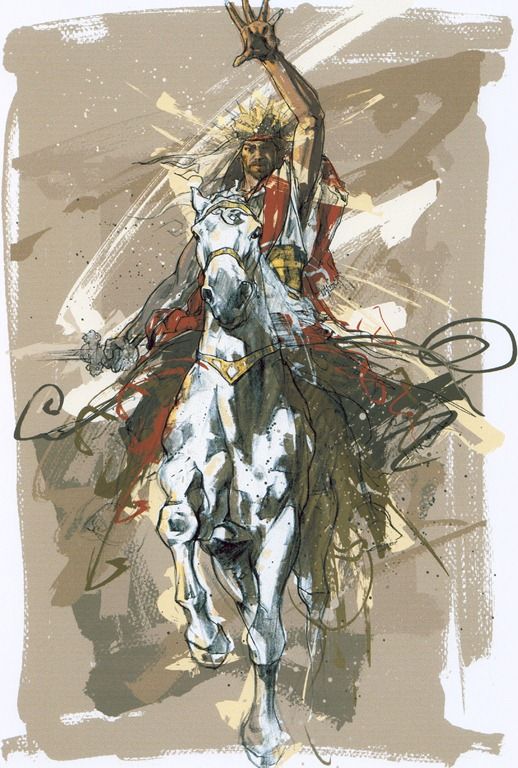Character of God
I agree and yearn for the day when apparently predator/prey relationships of all kind are abolished. I cannot wait for a day when the will of those I live for eternity with have no desire to sin, even if they are free to. That day is coming.
There is coming an existence in which there is eventually no need for violence or predation, real competition, etc., at least not for creation.
real competition, etc., at least not for creation.
However, this is not the peace of pacifism. This is the peace of conquest. Peace comes from God’s final subjugation of the enemies of creation.
“The Lord is a warrior” (Exodus 15:3) In Isaiah 42, which is at least partially a prophetic passage generally accepted among Christians to be about Jesus, vs 13 says that
“The Lord will march out like a champion, like a warrior he will stir up his zeal; with a shout he will raise the battle cry and will triumph over his enemies.”
Almighty God is no pacifist. Nor do I believe Jesus, as part of the Triune God, nor as proclaimed in prophecy, a pacifist.
I certainly do not think Satan would think of Him as one. As, in the last days, Jesus will defeat Satan in battle.
Further in the study of end-times prophecy, it seems that there will be a day for believers in which there will be no more sorrow, death, mourning, or pain, and God will wipe away their tears. (Revelation 21:4). I believe that the Micah passage about an end to war is about that existence which Jesus Himself will usher in to place via this conquest (Micah 4:3, Isa 65:25, Isa 11:6).
That being said, this is not that existence. We cannot usher in that existence by the way we act. It is not something that we can create on our own.
Here there is evil and predation, even among humans.
The Disney movie, Pocahontas, shows the title character dancing around in the forest proclaiming the peaceful nature of the animals and the web of life that connects them. As she  does this, she reaches into a bear’s den and takes out a cub.
does this, she reaches into a bear’s den and takes out a cub.
Her philosophy might have some impression if people could do that for real. However, when the mother bear crushed her into broken pieces, her beliefs might have been brought into question.
Declaring “peace, peace when there is no peace” in that way is delusional.
It is not common teaching among Christian pacifists that us being non-violent will lead to a non-violent world, but in some cases, the more liberal elements of this do teach this. This is foolish, in my eyes… even if ones argues that Jesus was non-violent and led his students to practice non-violence, there was no indication that this would reduce suffering.
In that new existence someday, there will no longer be a need for humans to protect other humans from other humans. There would be no call for self-defense (I use this term to apply to defending one’s own personal self and the well being of those we are responsible for).
Jesus was not into human utopianism.
He is a heavenly one, but clearly did not hope for mankind to solve our own issues. He was clear that there would be trouble (John 16:33) and persecution (John 15:19-20). He and His followers certainly were on the receiving end of violence.
In fact, the way that Jesus John 2:15 drove “them all out of the temple, with the sheep and oxen” (seeming to make clear that the “them” was someone other than the animals), sure makes it seem like any stance He had against violent behavior did not apply to Himself.
One can argue that Jesus wasn’t beating the men, sure… but there really isn’t any normal definition of “violent” that would not include driving people out with a whip of cords.
So, while the character of God in the past clearly involves violence and warfare, and Jesus was violent in His time on Earth, so too will His character be that of a warrior in the future.
I saw heaven standing open and there before me was a white horse, whose rider is called Faithful and True. With justice he judges and makes war. His eyes are like blazing fire, and on his head are many crowns. He has a name written on him that no one knows but he himself. He is dressed in a robe dipped in blood, and his name is the Word of God. The armies of heaven were following him, riding on white horses and dressed in fine linen, white and clean. Out of his mouth comes a sharp sword with which to strike down the nations. “He will rule them with an iron scepter.” He treads the winepress of the fury of the wrath of God Almighty. On his robe and on his thigh he has this name written: KING OF KINGS AND LORD OF LORDS. And I saw an angel standing in the sun, who cried in a loud voice to all the birds flying in midair, “Come, gather together for the gr eat supper of God, so that you may eat the flesh of kings, generals, and mighty men, of horses and their riders, and the flesh of all people, free and slave, small and great.” Then I saw the beast and the kings of the earth and their armies gathered together to make war against the rider on the horse and his army. But the beast was captured, and with him the false prophet who had performed the miraculous signs on his behalf. With these signs he had deluded those who had received the mark of the beast and worshiped his image. The two of them were thrown alive into the fiery lake of burning sulfur. The rest of them were killed with the sword that came out of the mouth of the rider on the horse, and all the birds gorged themselves on their flesh. Rev 19:11-21
eat supper of God, so that you may eat the flesh of kings, generals, and mighty men, of horses and their riders, and the flesh of all people, free and slave, small and great.” Then I saw the beast and the kings of the earth and their armies gathered together to make war against the rider on the horse and his army. But the beast was captured, and with him the false prophet who had performed the miraculous signs on his behalf. With these signs he had deluded those who had received the mark of the beast and worshiped his image. The two of them were thrown alive into the fiery lake of burning sulfur. The rest of them were killed with the sword that came out of the mouth of the rider on the horse, and all the birds gorged themselves on their flesh. Rev 19:11-21
Of course, it is part of God’s character to be an agent of peace – as well as to be a warrior (peace and war are not contradictory). But the pacifist is making the claim that we only follow the example of God’s character as peacemaker.
So, the pacifist is defending the claim that God is calling on us to live in a way differently than His character.
This is NOT impossible – an example of this is that it is morally right for God to be jealous, but not for us to be. Obviously, it is appropriate for God to accept worship, but not us. That makes sense.
However, these have to be explained – especially when God (back in the Genesis passage with Noah) has commanded man, under certain conditions, to shed the blood of man.
Head on to Part III to summarize what that burden is.
As a father and martial arts instructor I have encountered stories of depravity against women and children way more than I ever wanted to. Violence not only happened to several of my female students but to my daughters as well. This may have had the effect of coloring my opinions about doing violence to others. I have in my adulthood talked my way out of violence more than once, quite often with a very good bluff, which, seeing as how I can back up my bluff is really no bluff at all. I am really a good talker when the need arises, even if I have my hand on a weapon to back up the bluff. While I do not disparage the right of others to believe in strict non-violence I question that resolve when they come upon a child being raped or beaten by someone with evil intent. More so if that person is dear to them as family. Sometimes you may have to take actions you find distasteful in order to prevent the injury of others. If you are not willing to do so if the need arises then it is not your morality I think that is in question it is the state of your possibly craven heart. I think I would trust in God in the case of defense of another. I am sure He will understand and from past experience I think He actually lends a hand by bringing out the best abilities in the defender, or at least He has seemed to do so in my case. For those that cannot bring themselves to violence in any instance may God watch over them and see that they never need it.
Chris,
I love this series! This topic is one I explored deeply as a single man. Between about my sophomore year in college and my marriage, I was committed to pacifism (though, I was never forced to prove it). I think, even in my immaturity, I had a pretty steely view of humanity. I was under no Disney-esque delusion that choosing personal suffering or even death would make the world more peaceful or safe.
Instead, I came to the conclusion that my own life was not worth the possibility of damaging my witness. I think the pacifist Christian is one who has fully embraced his/her citizenship not of this world. Further, I could not bring myself to harden my heart and potentially do lethal violence to one who is yet damned when my death is simply a crossing into paradise. Of course, the salvation of my attacker is ultimately and eternally in God’s hands, but the idea of striking an image-bearer of God down into eternal torment was more than I was willing to shoulder. As a single man, I don’t think my calling reflected the violent aspects of God’s character. To have claimed that calling would have been, at least to some extent, self-interested. This is manifold, but here are the first couple aspects of this self-interest that immediately occur to me. First, the protection of my own life – I don’t think there is a strong argument through the whole NT for this idea and many, many calls for sacrifice. Second, the exalting of my strength – given the western take on masculinity, winning a fight a killing a man who was doing evil would have raised my profile is a really positive way with the crowd in which I run. I explain all this because labeling pacifism as utopian and illustrating with hippie garbage like Pocahontas feels strawman-ish. I think the real confrontation to your argument are stories like Desmond Doss. This raises the sobering question of how many have come to faith in Christ by seeing an evil man killed versus seeing a righteous man give his life with a weapon in his hand?
The moral aspect of this conversation is difficult, but I concluded that human-on-human violence (even in defense) is at best morally dubious (Prov. 3:31 is a good anchor point for this, but this idea can be richly supported across the whole canon). Conversely, personal sacrifice for the sake of peace is virtually unassailable. If, as I have heard you argue, we ought not to find the boundaries of right/wrong but seek the center of God’s best – why even explore human-to-human violence? This seems to me to be a foray to the boundary of sin. The above is the most difficult question for me to answer as I grapple with my new role as husband and father and your points about violence being part of God’s character are well taken.
As a father especially, I am confronted with the magnificent and impossible task of modeling God the Father to my daughters. As you mention, part of God’s character is the dangerous protector. I am still processing what this means for me and for my family, but I suspect that my stance is shifting more toward agnostic on this particular moral point.
Zach, good feedback. I hope by the end of this series that I didn’t respond only to straw-man arguments. In fact, I am not going to argue at all against an individual Christian’s convictions on this. My main purpose ended up being to lay the burden on the pacifist if they want to attempt to mandate pacifism as the correct stance for all Christians. I think we have to explore these conversations (like human-to-human violence) because they are present and called for by God in various places (and potentially mandated), and because of exactly what you stated – what do my obligations as a member of a community, a family, and as a citizen of the Kingdom demand of me when it comes to violence. At this stage, I still respect the decision of any believer to determine that pacifism is their personal conviction, but I think that viewpoint has some very difficult questions to answer.
Chris, I look forward to the rest of the series! I think if I were to distill all of my post into a sentence. It is that upon accepting Christ’s sacrifice for my sin, my life has become cheap and every other human life has become priceless: this makes enacting violence internally discordant at least and maybe downright irrational. Interestingly, this makes me assume that the advocate of self-defense is shouldering the ethical burden for justifying this discord.
As always, your eloquence is a thing of beauty. I totally agree with the sentiments you mention here. It is the application of these sentiments that are difficult – especially when there are others to potentially protect. I love that Christians have wrestled with this for 2 thousand years.